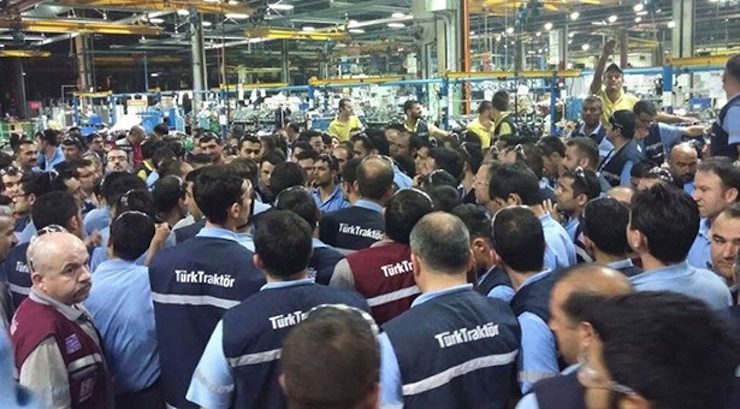
Investigation finds: European Development Bank fails to respect labor rights in Turkish investment
An independent investigation report, published last week, concludes that the European Bank for Reconstruction and Development (EBRD) failed to ensure protection of core labor standards when providing a EUR 30 million loan to Türk Traktör – a Turkish manufacturer of tractors and agricultural machinery. In response, EBRD committed to improve their internal procedures and commission an analysis on the gaps between international labor law and national law. The Bank, however, fails to commit to any concrete measures that would improve conditions or provide remedy for affected workers.
“We just wanted to have better working conditions and be able to choose our union freely, that’s why we went on a strike, like thousands of other workers in the sector,” said an anonymous worker, involved in leading the strikes. “As a result of exercising this right, we lost our jobs. Now it is impossible for us to find jobs in other factories because they know that we were dismissed because of leading the strikes. We expected that European institutions, such as EBRD, would uphold international law and their own standards. We hoped they would help us to be reinstated or at least receive our severance pay and compensation for all those years we worked in this factory and the resulting damage to our health.”
Investigation on fired workers, excessive overtime and more
Read the full complaint(opens in new window)
The investigation, conducted by the EBRD’s independent Project Complaint Mechanism (PCM), was in response to a complaint filed in September 2015 by the Turkish union, Birleşik Metal İş(opens in new window) , with the support of SOMO. The complaint argued that Türk Traktör was in violation of EBRD’s labor policy when it dismissed 20 Türk Traktör workers and workers’ representatives after they took part in a country-wide strike in May-June 2015, in which more than 30,000 metal workers demanded respect for their right to establish and join a labor union of their choosing. In addition the complaint also raised issues of compulsory and excessive overtime, salary levels, and the validity of the existing collective bargaining agreement – negotiated by a union workers are forced to join.
“The investigation report clearly establishes that the bank failed to protect workers’ rights. Now the question is will they right their wrongs? Will they do something for the workers who lost their jobs?” says Eyüp Özer, International Secretary of Birleşik. “Turkey is one of the biggest markets for EBRD, but the country is also known for its failure to respect labor rights. EBRD has a responsibility to make sure at least its own investments don’t contribute to violations of the most basic human rights.”
Main findings of the PCM Investigation of Türk Traktör
Read the full report of the Project Complaint Mechanism(opens in new window)
- The EBRD failed to adequately monitor issues around overtime, occupational health and safety;
- The EBRD did not adequately assess and act upon issues around freedom of association;
- The EBRD did not undertake an evaluation of the dismissals that took place at Türk Traktör following the industrial action in 2015, and failed to evaluate Türk Traktör’s adherence to the ILO Core Conventions;
- The EBRD failed to routinely monitor Türk Traktör’s implementation of a (required) external grievance mechanism.
The investigation report points to the EBRD’s inaction in addressing freedom of association issues at Türk Traktör after being informed of problems: “More than one year after the Complainant’s initial contact with [EBRD], [the bank] has not fully evaluated the substance of the series of allegations regarding freedom of association at Türk Traktör. This does not fall within any acceptable boundaries of discretion that may be offered by EBRD’s monitoring obligations.” In the context of apparent tension between Turkish national labor law and the ILO Core Conventions, the report recommends that “EBRD should procure an analysis of ILO principles […] and of national legal issues and risks associated with the dismissal of twenty workers following the May 2015 industrial action at Türk Traktör.”
Remedy not part of bank’s response
Read the Management Action Plan of the ERDB(opens in new window)
The EBRD responded to the report’s findings by committing to:
- Undertake an analysis of the differences between Turkish law and the International Labour Organization’s core conventions;
- Commission an independent analysis of the dismissals of the workers against the provisions of the ILO conventions;
- Update its internal guidance materials on freedom of association;
- Improve its due diligence process;
None of these actions will provide remedy for or result in concrete changes in the conditions for current or formers workers at Türk Traktör. The workers who were fired during and after the strike, for example, still have not received compensation for their dismissals.
EBRD’s investment in Türk Traktör and other companies in Turkey
source of per centages: bloomberg(opens in new window)
In March 2013, EBRD granted a EUR 30 million loan to Türk Traktör, which would finance, in part, the construction of a new tractor plant in Sakarya and further develop an existing factory in Ankara. In May 2014, another EUR 20 million EBRD loan was granted to Türk Traktör for investment in the Erenler plant. Türk Traktör is a joint venture between FIAT-Chrysler and Koç Holdings. Koç Holding employs more than 35,000 workers in the Turkish metal sector, and its sales accounted for approximately five per cent of Turkey’s GDP in 2014.(opens in new window)
Labor rights issues are not unique to Türk Traktör. Workers from two other EBRD clients participated in the 2015 strikes, demanding freedom of association, some of whom were also dismissed. EBRD provided a EUR 70 million loan to Ford Otoson and EURO 100 million to Tofaş (a joint venture of Fiat and Koç Holding). Complaints regarding these investments have not yet been filed.
Read more:
- Read the full Compliance Review Report(opens in new window) of the Project Complaint Mechanism
- The Management Action Plan(opens in new window)
- Complainants’ Response(opens in new window) to the Action Plan
Partners
Related news
-
 SOMO submits input for update of UN List on corporate involvement in Israeli settlementsPosted in category:NewsPublished on:
SOMO submits input for update of UN List on corporate involvement in Israeli settlementsPosted in category:NewsPublished on: -
Chain of consequences Published on:
 Joshua RosenzweigPosted in category:Publication
Joshua RosenzweigPosted in category:Publication Joshua Rosenzweig
Joshua Rosenzweig
-
Fuelling the flames in Gaza Published on:
 Lydia de LeeuwPosted in category:Publication
Lydia de LeeuwPosted in category:Publication Lydia de Leeuw
Lydia de Leeuw

